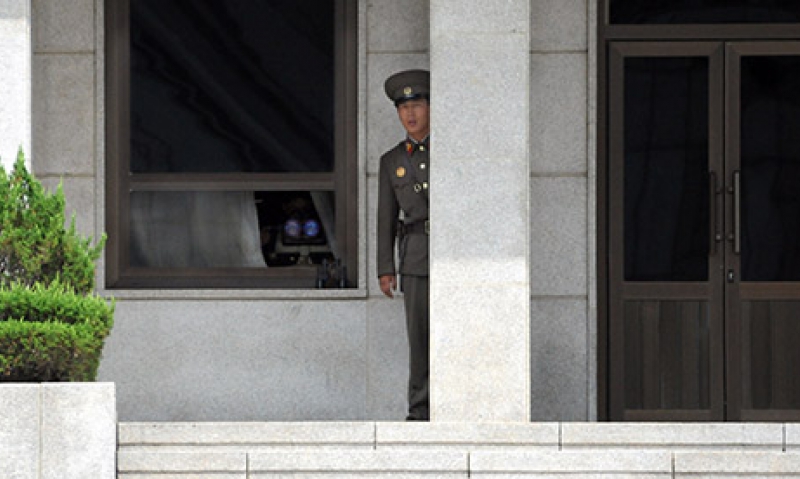
While no one can predict when the Kim dynasty will collapse, history offers some examples of how it could.
Video recently smuggled out of North Korea reveals footage of people begging for food, children orphaned by mass starvation and mass imprisonment, and desperate soldiers demanding bribes. "Everybody is weak," reports one North Korean soldier. "Within my troop of 100 comrades, half of them are malnourished." This is significant given that in the past, the military got the people's food rations.
These are glimpses of the beginning of the end of Kim Jong Il's regime. While no one can predict when the Kim dynasty will collapse, history offers some examples of how it could.
The ideal parallels - the economic liberalization of China, or the bloodless reunification of East and West Germany - seem the least likely. The prospect of North Korea following China down the path of quasi-capitalism is beyond remote. This is a closed society, with an economy smaller than virtually every state in the United States; a country whose most lucrative exports are retrofitted Soviet-era missiles and counterfeit $100 bills, and whose citizens are required to donate food to the armed forces. Where China is confident and open, North Korea is paranoid and closed. Where China's leaders have adapted to the world, North Korea's leaders cling to an anachronism.
As to the German-reunification scenario, it pays to recall that North and South Koreans, quite unlike East and West Germans, fought each other in a brutal war, which means that they bear scars and wounds that pre-unification Germans did not. Plus, East Germans had no "Dear Leader" to worship. By 1989, even the true believers understood that the communist state was dead. This is not the case in North Korea, where the people are completely isolated from the outside world - and totally controlled by a propaganda machine that deifies the regime.
In other words, North Koreans don't appear to have the will or the wherewithal - or simply the strength, given a diet that relies on grass as a staple - to tear down Kim's government. There is no "Pyongyang spring" on the horizon, no North Korean Havel or Wałęsa to channel the pent-up fury, no Korean pope to speak truth to power. And even if there is some germ of a freedom movement in North Korea, it's hard to imagine the North Korean People's Army (NKPA) remaining garrisoned, like the Soviet Red Army did in 1991, if Kim or his sons ever call for help.
The NKPA is the most paranoid, propagandized and privileged part of North Korea. If it cared about the North Korean people, it would have ended Kim's reign many years ago. Instead, it seems committed to sustaining the regime, whatever it takes.
That brings us to the nightmare scenario - a lashing out by Kim that sends shrapnel in every direction. As a once-classified Pentagon report warns, there is "the possibility of conflict spurred by internal instability, miscalculation or provocation." (Indeed, one wonders how many more unprovoked naval attacks and artillery barrages South Korea can ignore.)
The best version of this worst-case scenario would feature China doing the opposite of what it did during the Korean War: using its military leverage to end the North Korean regime rather than sustain it, to shorten the war rather than prolong it. But even a short war would be brutal. In their 1998 book "The Next War," Peter Schweizer and the late Caspar Weinberger predicted that a second war would claim almost 19,000 American casualties in less than 90 days of fighting.
Seoul would bear the brunt of the blow. The city sits just 25 miles from the DMZ, the northern edge of which is bristling with a million North Korean soldiers and 11,000 artillery pieces. Gen. Leon LaPorte, the former commander of U.S. forces in Korea, noted in 2005 that every third round fired by North Korea would be a chemical weapon.
"I'm confident we would be able to stop an attack," says Gen. Walter Sharp, outgoing commander of U.S.-ROK forces. But he adds this note of caution: "There would still be a lot of destruction."
The 1950-1953 war, among the bloodiest in U.S. history, offers a glimpse of the kind of destruction another war would unleash. Moreover, with his modified missilery and an army of commandos trained in terror, Kim would try to strike U.S. soil and would certainly hit Japan. And unlike Korean War I, we have the specter of a mushroom cloud hanging over Korean War II.
The fact that a second war would end Kim's beastly regime is of little comfort. Such a war would give new meaning to the term "Pyrrhic victory."
We can hope for a miraculous replay of 1989 in Berlin or 1991 in Moscow, for one of Kim's sons to become a born-again democratic capitalist. But Korea's history and Kim's behavior give us little reason to hold out such hopes.
If we're fortunate, North Korea will fall like a rotten tree, rather than explode like a time bomb. Until then, Washington's goal should be to brace for the worst, run out the clock and avoid another war. That's how U.S. administrations have measured success in Korea for 58 years. And given what Korean War II would look like, it's a worthy goal.
- Landing Zone

